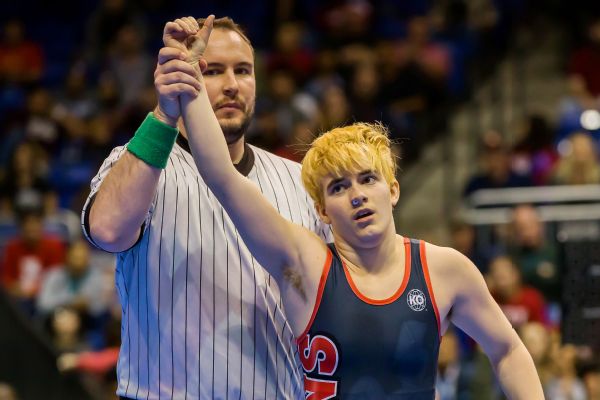The growing debate surrounding transgender athletes
High school wrestler Mack Beggs is in the process of transitioning from female to male, but state policy allows him to wrestle against girls only
More stories from Scott Procter

Photo by SUBMITTED
Recent events surrounding a transgender high school wrestler have America scared for what the Trump administration has in store.
Texas high school wrestling championships don’t normally make national news, but this year was an exception.
The tournament headlined 17-year-old Mack Beggs, a transgender boy, who won his weight class against girls. Biggs has been transitioning from female to male for a year and a half, but Texas rules state students must compete as the gender marked on their birth certificate.
Beggs said he wants to wrestle against boys, and many people agree he should. His participation and dominance in the girls’ league has caused dismay among many of Beggs’ competitors, specifically their parents. Some of Beggs’ competitors even forfeited their matches in the regional meet, citing a fear of injury. Beggs claimed via social media the forfeitures were the actions of parents and coaches, not the wrestlers. More often than not, high school kids just want to compete — they don’t care who is put in front of them to wrestle.
The same goes for Beggs, who won the state championship with a winning score of 12/2 in the 110 weight class. He won the 6A championship, the largest enrollment wrestling class, capping off a 52-0 season.
But it wasn’t all sunshine and rainbows for Beggs.
Adding to the controversy of the situation, Beggs’ transition treatment includes taking testosterone. Many competitors and fans argue this treatment gives Beggs an unfair advantage.
A lawsuit was filed by a parent of a competitor who argued Beggs should be wrestling against boys if he identifies as such. The lawsuit sought to ban Beggs from competing against girls and boys in the state tournament as long as he is taking testosterone. However, Texas Education Code rules allow the use of steroids if prescribed by a medical practitioner, making Beggs fully eligible to wrestle.
Beggs’ victory came just days after the Trump administration removed some federal protections for transgender students. These protections, initially put in place by President Barack Obama, instructed public schools to allow transgender students to use restrooms and locker rooms that correspond with their gender identity.
Beggs is a microcosm of the messy reality of gender. Transgender boys and girls aren’t going anywhere, and conflicts dealing with them leave lawmakers with one of two options: Accommodate everyone who identifies as transgender, or refuse to accommodate and pretend the issue doesn’t exist.
There are drawbacks to each solution. Accommodating each and every transgender athlete may lead to fear of cheating the system, men competing against women for example. It mirrors the argument of transgender women in bathrooms, the idea that men who are not actually transgender will take advantage of the law to victimize women and avoid any consequences.
The second solution puts a state school system or government in the unfair position of judging the validity of transgender people. It is not for the state, or any entity like it, to determine whether someone’s experience transitioning genders is real or not.
This should not be a crisis. Everyone, including Beggs, seems to agree he should be wrestling boys, seeing as he identifies as a male himself. Beggs wrestling against girls represents the conundrum of government trying to impose black and white boundaries on the complex spectrum of gender.
State and federal government should accommodate transgender people as much as possible for the simple idea of acceptance and people’s right to control their own bodies and identities. There will surely be uncomfortable situations and conversations regarding this issue, but those uneasy feelings should not prevent people from being who they are or even limit their chances to participate in the sport they love.

